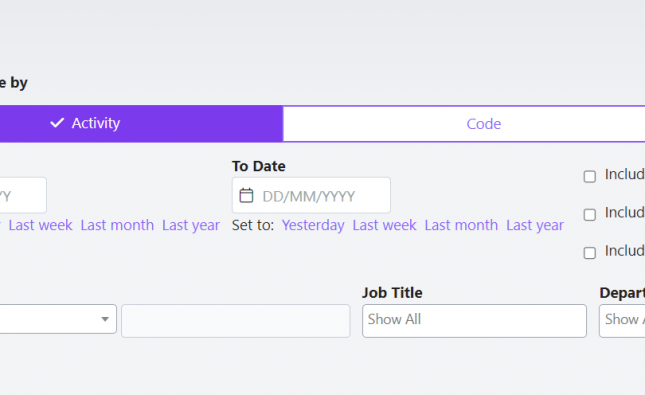Our related Courses
January is a tough month for many; the combination of dreary weather, failing New Year’s resolutions, the post-Christmas diet and the financial worries of trying to stretch that early December paycheck to the end of January – there’s no shortage of reasons why people might feel down and lack motivation this month.
It’s no surprise then that January is also the UK’s peak time for sickness absence and stress in the workplace, meaning that staff morale and general productivity will be at an all-time low.
Whilst there is no simple answer or a one-size fits all solution to help your staff beat the blues this January, employers can consider small actions to help improve staff wellbeing and positivity which can benefit both employees and businesses alike.
Focus on employee engagement
Communication and involvement are key to making employees feel like they are an important part of the organisation. If they don’t understand what the business is trying to achieve this year or they don’t feel valued themselves, why would they feel motivated or inspired to work hard all year round?
Take time to discuss personal and professional plans for the year and help to set some achievable goals to help drive motivation.
Recognise the successes of the previous year
Recognising the successes of 2022 is a great way to keep your employees motivated throughout January.
More frequent employee feedback and praise as and when appropriate can also help people feel appreciated and valued. If a staff member does a good job, tell them, if they are always performing at a consistently high level, acknowledge this to ensure they know that their efforts are not overlooked but are seen and appreciated.
Practice sensitivity
We are all individuals and what works for one person may not work for another. The reasons why a person may be feeling down, disengaged or fed up will also differ. Some may have more deep-rooted reasons behind their behaviour and/or feelings.
Try and spot signs that someone is unhappy and talk to them about it. Ask if there is anything that can be done to provide support and assistance. If they don’t want to talk about it, don’t push the point. However, look to revisit the conversation again later to see if there is an opportunity to help. In the meantime, make them aware of any employee assistance programmes you may have in place, where they can discuss issues in confidence.
If you feel that a person has more substantial issues than just feeling a bit fed up because it’s January, signpost them to mental health first aiders or external support and counselling services. Depending on the situation, reasonable adjustments may need to be considered and specific advice should be taken on how best to manage and support these individuals on a case-by-case basis.
Lead by example
Just as negativity within a team can spread, so can positivity.
Even if managers business leaders don’t feel entirely upbeat themselves, if they communicate positive messages to their teams, praise and give positive feedback to individuals, this can help their workforce to feel more positive and that, in turn, may assist leaders in feeling more positive also.
Small gestures reap big rewards
Ask employees what changes can be made to help them through January – for some this may be additional team engagement (especially if staff are working remotely), for others it may be biscuits or healthy snacks in the break room, or a care package to remote workers.
The changes need not necessarily be high financial value, but they could result in large gains in productivity, employee engagement and a better, more positive working environment for all.
Encourage a healthy lifestyle and regular exercise
During the dark winter months, it’s not always easy to see daylight during the working day which can be detrimental to a person’s health and wellbeing. Encouraging staff take regular breaks away from their desks and getting out in the fresh air at lunchtime to see natural daylight, can prevent energy levels from slumping and help stabilise mood boosting hormones.
Plan for time off
There is no better way to lift the January blues than booking a holiday in a sunnier climate. Employers should ensure that holiday calendars are up and running and employees are clear of their remaining holiday entitlements for the year ahead and whether carrying over of untaken holiday from the previous year is permitted under your policy. A simple reminder of your holiday request procedure, together with any restrictions on taking holidays during peak times such as the school holiday period, should help prompt staff in the midst of winter to look forward to better and more warmer things to come.
Whilst the above measures can minimise the prospect of employees feeling the January Blues at work, it is important to recognise that mental health is an issue that employers should be supporting all year round. The HSE recently revealed that 30.8 million working days were lost to work related ill health in 2021/22, showing that stress, depression and anxiety is far from being confined to January.
Anyone can experience mental health difficulties at any stage of their life. Historically mental health has been something that many people don’t feel able to openly acknowledge or discuss, which means problems all too often don’t get resolved and only escalate.
Our wellbeing training courses aim to change that by giving staff a practical understanding of mental health, anxiety and depression and stress awareness. Equally as importantly, though, they provide them with guidance on how they can help colleagues with their wellbeing and create an inclusive and supportive workplace culture.
Courses include:
- Recognising Anxiety and Depression
- Spotting Mental Health Red Flags
- Supporting Your Colleagues’ Mental Health
- Stress – Identifying Stress in Your Team
To view our full range of wellbeing courses, click here.



